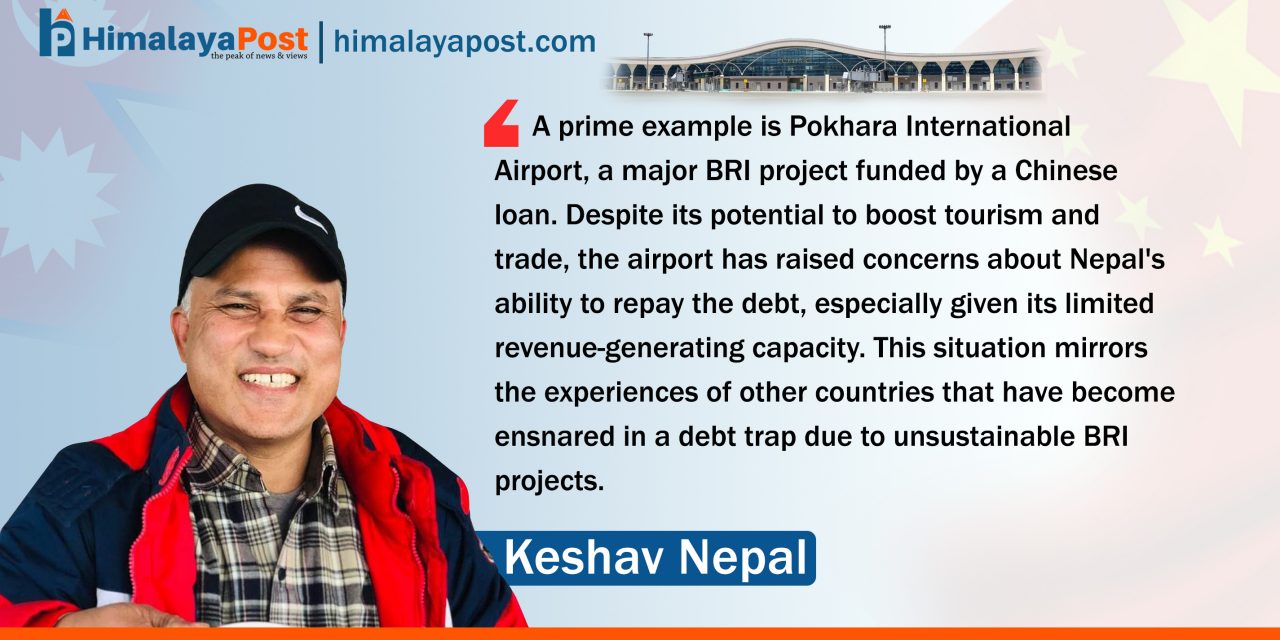-Keshav Nepal
Kathmadu-Pokhara International Airport, a prominent venture under China’s Belt and Road Initiative (BRI), has sparked a discussion in Nepal regarding the risks involved in major foreign-funded projects. Built with a substantial loan from China’s Exim Bank, the airport has intensified concerns over the financial obligations Nepal may incur without sufficient economic returns to cover these costs. Seven years into the BRI agreement, questions linger about its pace of progress and the wider implications for Nepal’s economy, sovereignty, and international standing.
Nepal joined the BRI in 2017 with the aim of achieving growth, economic integration, and robust infrastructure development. The MoU outlined plans to strengthen Nepal’s connectivity through transit facilities, logistics support, and secure transport networks. The Kerung-Kathmandu railway is a key component of the proposed connectivity goals, which include civil aviation, power grids, and improved information technology. In line with this vision, China initiated a feasibility study for the railway, aiming to link Nepal more closely with Chinese markets.
Despite such promises, progress on various BRI projects has been slow, raising concerns about the initiative’s momentum. Shifts in Nepal’s political landscape have kept the BRI subject to periodic scrutiny. During a 2022 visit by former Chinese Foreign Minister Wang Yi, Nepal conveyed its preference for grants and aid over loans for BRI projects. This approach reflects Nepal’s cautious strategy, aiming to avoid the financial pressures that some countries have faced through unsustainable BRI-related debt. This caution is particularly relevant to major undertakings such as the proposed Kerung-Kathmandu railway.
The financial strain surrounding Pokhara International Airport highlights these issues. In 2015, Nepal took a loan of 1,378.74 million yuan (about NPR 25.88 billion) from the China Exim Bank to fund the airport’s construction. Although it officially opened in January 2023, the airport has yet to attract enough international flights or generate the revenue needed to meet loan repayments. Nepal’s request for China to convert this loan into a grant illustrates the financial pressures associated with the project, though this request remains unanswered.
This scenario mirrors the cautionary examples of debt-dependency often cited in discussions of BRI projects. Sri Lanka’s Hambantota Port, a BRI-funded project, had to be leased to a Chinese company for 99 years after the country was unable to service its debt. Similarly, countries like Pakistan and Laos have encountered financial stress from BRI engagements, raising alarms in Nepal over the dangers of an over-reliance on loans. Pokhara Airport’s financial difficulties could signal further challenges if future projects are undertaken without careful assessment of their long-term viability and economic benefit.
Nepal’s approach to BRI projects also involves a complex geopolitical balancing act. Sharing borders with both China and India, Nepal is keenly aware of the need to maintain positive relations with each. Prime Minister K.P. Sharma Oli’s alignment with China, including the upcoming China visit after receiving no invitation from India, has created strain in Nepal-India relations. As BRI projects progress, Nepal must walk a careful line to prevent tensions and maintain a balanced stance in its relationships with both regional powers.
Beyond financial and geopolitical considerations, BRI initiatives in Nepal underscore the need for transparency, accountability, and feasibility. Converting Pokhara Airport’s loan into a grant would ease the financial burden, but the long-term solution lies in ensuring that future projects under BRI are sustainable, economically beneficial, and in line with Nepal’s development priorities. Any forthcoming projects, like the Kerung-Kathmandu railway, should be executed to support Nepal’s economy without incurring unsustainable debt.
Nepal’s cautious stance on BRI projects marks a pragmatic shift in its dealings with China. Rather than engaging in new initiatives based on development promises alone, Nepal prioritizes its national interests, aiming to retain both financial independence and balanced international relations. As it navigates the global landscape, Nepal must remain vigilant to protect against debt dependency while embracing potential growth from initiatives like the BRI.
In essence, Nepal’s experience with Pokhara International Airport is a valuable lesson in managing foreign investments. BRI presents both opportunities and challenges, requiring Nepal’s leaders to weigh each decision carefully, bearing in mind the economic, political, and societal impacts. By upholding a balanced approach, Nepal can work towards gaining the benefits of BRI while steering clear of debt-trap risks, thus paving a sustainable path for development that respects both its financial and sovereign interests.





